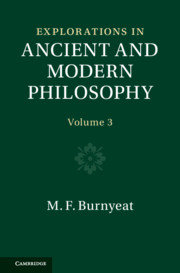Book contents
Chapter 8b - Lecture II. Art and the menace of mimesis
from Chapter 8 - Culture and Society in Plato’s Republic
Published online by Cambridge University Press: 24 March 2022
Summary
It is often said that in the Republic Plato proposes to ban art and poetry from his ideal society. The truth is that poetry – the right sort of poetry – will be a pervasive presence in the life of the warrior class whose upbringing and education are discussed in Books 2 and 3 of the Republic. What Plato develops here is a systematic anti-democratic programme for reforming music, i.e. musical poetry, incorporating dance as well as song. There are four stages in the programme: first, purging poetic content; second, placing severe restrictions on the manner of performance and on those permitted to engage in it, and particularly on the extent of mimesis or impersonation deemed allowable in performance, on account of its influence on character; third, placing similarly severe restrictions on musical technique, particular on the musical modes composers are allowed to employ in constructing melodies; and fourth, ensuring that the material and social settings in which musical poetry is performed are also designed with a gracefulness and beauty that will work their appropriate effect on the performers, providing the ideal conditions for them to fall in love, homoerotically conceived.
Information
- Type
- Chapter
- Information
- Explorations in Ancient and Modern Philosophy , pp. 183 - 207Publisher: Cambridge University PressPrint publication year: 2022
